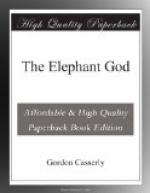Dermot turned to him again.
“Do Bhuttias talk to each other in Bengali? The leader gave his orders in that language to one man—who, by the way, was the only one he spoke to—and that man passed them on to the others in Bhutanese.”
This statement caused a sensation in the company.
“By Jove, is that a fact, Dermot?” cried Payne.
“Yes. These two were the men I shot. Do Bhuttias, unless they have just looted a garden successfully—and we know these fellows had not—carry sums like this?” And Dermot threw on the supper-table a cloth in which coins were wrapped. “Open that, Payne, and count the money, please.”
All bent forward and watched as the planter opened the knot fastening the cloth and poured out a stream of bright rupees, the silver coin of India roughly equivalent to a florin. There was silence while he counted them.
“A hundred,” he said.
Dermot laid on the table a new automatic pistol and several clips of cartridges.
“Bhuttias from across the border do not possess weapons like these, as you know. Nor do they carry English-made pocket-books with contents like those this one has.”
He handed a leather case to Granger who opened it and took out a packet of bank notes and counted them. “Eight hundred and fifty rupees,” he said.
The men around him looked at the notes and at each other. A young engineer whistled and said: “Whew! It pays to be a brigand. I’ll turn robber myself, I think. Poor but honest man that I am I have never gazed on so much wealth before. Hullo! What’s that bit of string?”
Dermot had taken from his pocket the cord that he had cut from the corpse of the second raider and laid it on the table.
“Perhaps some of you may not be sufficiently well acquainted with Indian customs to know what this is.”
“I’m blessed if I am, Major,” said the engineer. “What is it?”
“It’s the janeo, or sacred cord worn by the three highest of the original Hindu castes as a symbol of their second or spiritual birth and to mark the distinction between their noble twice-born selves and the lower caste once-born Sudras. You see it is made up of three strings of spun cotton to symbolise the Hindu Trimurti (Trinity), Brahma, Vishnu, and Siva, and also Earth, Air, and Heaven, the three worlds pervaded by their essence.”
“Oh, I see. But where did you get it?” asked the engineer.
“Off the body of the second man that I shot, together with the pistol and pocket-book. Now, Bhuttias do not wear the janeo, not being Hindus. But high-caste Hindus do—and a Brahmin would never be without it.”
“Oh, no. So you mean that the man wasn’t a Bhuttia?”
“This is the last exhibit, as they say in the Law Courts,” said Dermot, producing a pair of gold-rimmed spectacles. “You don’t find Bhuttias wearing these.”
“By Jove, no,” said Granger, taking them up and trying them. “Damned good glasses, these, and cost a bit, too.”




